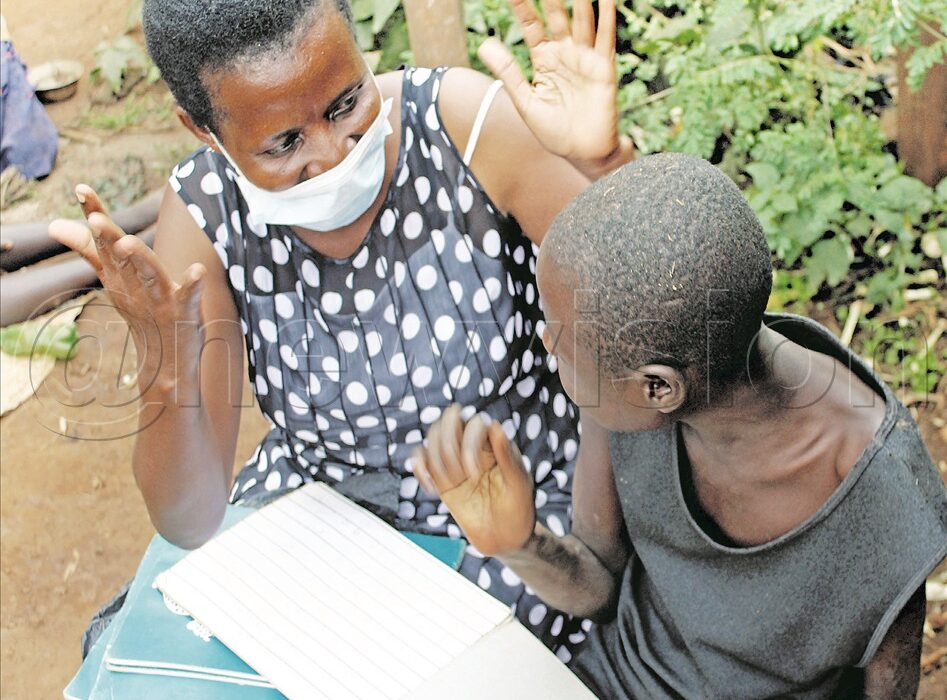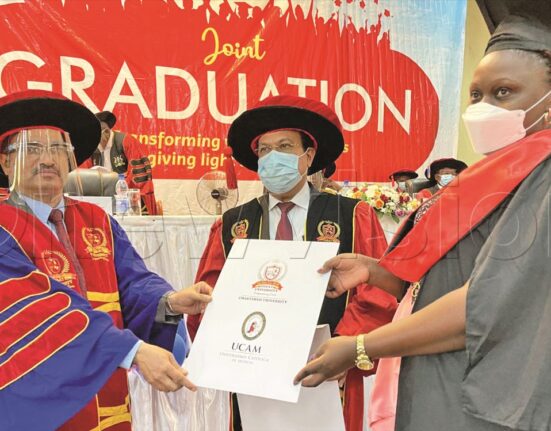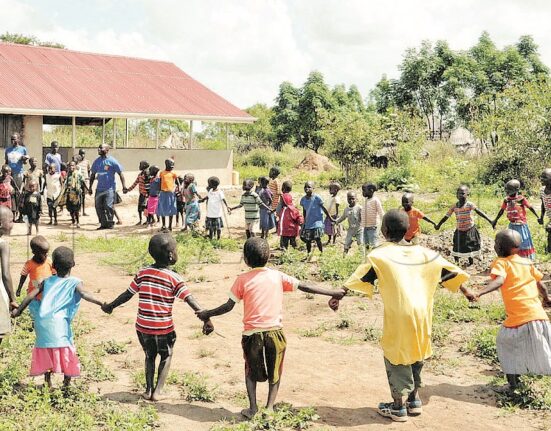By George Bita
Ever since schools closed in March last year, twins Bright Tenywa and Herman Waiswa have never received any braille learning material as promised by the Government. The two deafblind pupils of Buckley High School in Iganga district went back home to Mafubira, Jinja district when the schools were closed following the outbreak of COVID-19. They now spend much of their time redundant at home.
According to Christine Asire, their caregiver, the twins have been home for almost two years with their mother, Scovia Nanangwe, eagerly waiting for schools to reopen.
“The most challenging aspect is they do not have reading material to ensure continuity in learning. Two years without studying could impact negatively on their learning capabilities,” Asire says.
Nanangwe discloses that the nine-year-old twins have been in Primary One for two years now and are showing signs of uneasiness about it.
Charles Luletero, the Buckley High School deputy headteacher, says donors had provided for the twins’ stay at school even during holidays, but the COVID-19 pandemic disorganised everything.
“Like every other child, this time they had to leave school to curb the spread of COVID-19. This state of affairs put them at a disadvantage,” Luletero says.
Ayasi Mwanja, a Primary Five pupil from Buwenge zone in Jinja district, has been staying with his grandmother since Spire Road Primary School in Jinja city was closed in June.

“I have not been able to read again since schools closed because my revision requires use of a braille machine. The gadgets are school property and can only be used on school premises,” Mwanja notes.
Oliver Apio, a Primary Four pupil of Igamba Primary School in Iganga municipality, spends most of her time idling in the doorway of their rented tenement at Nkatu slum in Iganga municipality.
“Since she can neither see nor hear her fellow children play, she just sits on her own. Gone are the days when she would go to school and happily interact with fellow pupils and learn new things,” laments Marcy Akucho, her mother.

What Went Wrong?
After schools were closed on March 20, 2020 during the first wave of COVID-19, the Government duly dispatched reading materials for learners from Primary One to Senior Six. However, none of the literature was in braille format, which is relevant to the deafblind.
Baker Kasadha, the Iganga district education officer, affirms that when NCDC dispatched reading materials to learners through the local councils, there was no appropriate material for special needs learners.
Kasadha adds that the concerned authorities had been alerted and there was a promise to deliver special needs materials at a later date.
Lydia Namakiika, the Sense International coordinator for eastern Uganda, reveals that over 100 children are facing hardship accessing reading materials in the region. Sense International is a non-governmental organisation that supports visually impaired children.
“Of course, the dilemma is not limited to education as these learners equally face a challenge of proper feeding, usually catered for by donors at schools. Even their healthcare is wanting,” Namakiika says.
Situation Elsewhere
The education ministry data (February 2020) shows that there are 172,864 special needs children in primary schools, making up 2% of the primary level enrolment, while another 8,945 attended secondary schools. The 1,370,583 total secondary school population puts the percentage of those under special needs at 0.6%.
Namakiika says when schools closed, the children went back to their respective parents and guardians scattered throughout the 11 districts of Busoga and beyond.
According to Namakiika, although Sense International has a category of deafblind children and youth under home-based care, not every special needs learner falls in this category.
“Those under home-care could not fit into the school arrangement maybe due to their health status or disability, so they are associated with a nearby school. A teaching assistant from such an institution makes four visits or less in a month to train them, depending on availability of transport,” she says.
Namakiika explains that this arrangement is part of Sense International’s programme on inclusive education for deafblind learners.
“In the meantime, special needs learners under the school system are currently just home with their parents. Up to now, we have not received any literature for them from the National Curriculum Development Centre (NCDC),” she says.
Sister Winifred Agwang, the headteacher of St Francis School of the Blind-Madera in Soroti city, says the over 100 learners are now at home without reading materials following the closure of schools due to COVID-19.
“For a special needs learner, much of the reading is facilitated by machines at school. It becomes quite difficult for them to cope away from the school’s appropriate learning environment,” she says.
Neglected
Agwang says NCDC has not included the deafblind in its planning for home-schooling material, which complicates the already precarious situation in which these special needs learners are in.
She says the school farm enabled the students to have a balanced meal, which is key for proper growth, but the feeding at home may be inferior due to the socio-economic status of the parents.
Umar Nkondo, a special needs learner from Bugade village in Mayuge district, is worried that he may never go back to school after staying for long away from class.
“As the rest of the pupils received literature from NCDC, for us we were not catered for. It is more like we are a forgotten category,” Nkondo says.
John Nakasulo, a special needs teacher at Iganga Girls’ Secondary School, explains that most of the braille equipment is expensive and usually provided by donors.
“We have gadgets such as an embosser machine which can convert print into braille and ordinary brailler, among others. The learners find them at the department and use them only while at school,” Nakasulo notes.
About Braille

Braille is a type of writing felt by fingertips of visually im-paired learners so as to easily discern messages therein.
James Mukoti, the Nampirika LCI chairperson in Iganga district, says whereas the Government delivered reading materials for children during the lockdown through the National Curriculum Development Centre (NCDC), none was sent for the special needs category.
“Families with visual and hearing impairment came to me seeking the materials, but I had not received them. I inquired from colleagues, but they were in a similar predicament,” Mukoti says.
He emphasises the need for schools to reopen so that such disadvantaged learners can access essential tools needed to learn effectively.
“As the Government caters for learners, they are leaving out an important group of special needs. These children need close monitoring and exposure to machines that facilitate their learning,” Nakasulo asserts.

Unfairness
Rosemary Namugeni, a deafblind student at St Francis School of the Blind-Madera, refers to the status quo as injustice, whereby just one group of learners is being catered for while leaving out the rest.
“By the way, after schools reopen, we shall sit the same examinations, regardless of how we have been facilitated to revise during the COVID-19 break. It is quite an unfortunate state of affairs,” she claims.
Douglas Tigatoola, a Primary Two pupil of Kaliro Church Primary School in Kaliro district, wonders when the right type of reading material for home study would be delivered to him.
Margaret Dadye, Tigatoola’s teaching assistant, says the lack of the right reading material in braille has affected the academic progress so far made by Tigatoola.
“Currently, schools are closed and he cannot access literature from the special needs office. We would have been in a better position if the Government had sent us braille literature,” Dadye says.
Racheal Kadondi of Lwanda village in Luuka district is in a similar dilemma after spending almost two years away from the classroom.
“I last sat in the Primary Three class in March last year. It is now coming to almost two years without studying and I have no reading material to keep me busy,” Kadondi says.
She says the only activity she participates in is being led by her brothers and sisters to the village borehole to fetch water.









Leave feedback about this